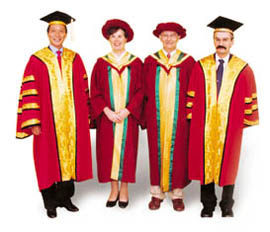
HKIEd staff and students will always remember the contributions Professor Ruth Hayhoe made during her term of office as Director. During this period 13 new programmes were validated, four Schools were established, new Centres were set up and HKIEd was increasingly represented internationally, regionally and locally. It is not only Professor Hayhoe's work that will be missed, but the magnitude of her vision, her enthusiasm in education, her insight in scholarship, her dedication to the Institute and her amicability in social relations. I was very honoured to be asked to interview Professor Hayhoe so that colleagues could have a chance to keep in touch with her, listen to her views once again and learn from her reflections. Below are her responses to some of the questions I asked her when she attended the Congregation for the conferment of her Honorary Doctorate.
Would you once again share with us why you decided to come to Hong Kong to take up the Directorship of HKIEd?
The opportunity of coming back to Hong Kong to serve the Institute during this exciting time was very attractive to me. When I was approached, I felt it was really a difficult task, but very soon the excitement took over. 1997 was an important time for Hong Kong, moving from being a colony to becoming a part of China. The transition was important for Hong Kong to take up a new role, a more independent role, in bridging East and West and in deepening spiritual and cultural understanding for the global society, and I believed Hong Kong had the capacity to do so.
What comes to mind when reflecting upon your five years of work at HKIEd?
I have observed a genuine sense of civic identity growing in Hong Kong: students became really excited about learning Putonghua, schools became more attached to Chinese civilisation, there were increased visits to schools in the Mainland and active donations going on in support of various educational establishments in the Mainland. When the national flag was raised on National Day and during our Congregations, it led me to reflect profoundly on how very different it would have been if Hong Kong were still a British colony.
HKIEd has played a significant role in fostering Hong Kong's new identity, from its emphasis on civic education to the teaching of Putonghua in our programmes. The fact that HKIEd students won debate contests in the Mainland has significant implications not only for the Institute but also for Hong Kong as a whole - our students can use Putonghua effectively to the extent that they could win competitions at the national level.